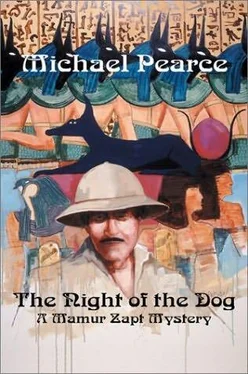Michael Pearce - The Mamur Zapt and the Night of the Dog
Здесь есть возможность читать онлайн «Michael Pearce - The Mamur Zapt and the Night of the Dog» — ознакомительный отрывок электронной книги совершенно бесплатно, а после прочтения отрывка купить полную версию. В некоторых случаях можно слушать аудио, скачать через торрент в формате fb2 и присутствует краткое содержание. Жанр: Исторический детектив, на английском языке. Описание произведения, (предисловие) а так же отзывы посетителей доступны на портале библиотеки ЛибКат.
- Название:The Mamur Zapt and the Night of the Dog
- Автор:
- Жанр:
- Год:неизвестен
- ISBN:нет данных
- Рейтинг книги:3 / 5. Голосов: 1
-
Избранное:Добавить в избранное
- Отзывы:
-
Ваша оценка:
- 60
- 1
- 2
- 3
- 4
- 5
The Mamur Zapt and the Night of the Dog: краткое содержание, описание и аннотация
Предлагаем к чтению аннотацию, описание, краткое содержание или предисловие (зависит от того, что написал сам автор книги «The Mamur Zapt and the Night of the Dog»). Если вы не нашли необходимую информацию о книге — напишите в комментариях, мы постараемся отыскать её.
The Mamur Zapt and the Night of the Dog — читать онлайн ознакомительный отрывок
Ниже представлен текст книги, разбитый по страницам. Система сохранения места последней прочитанной страницы, позволяет с удобством читать онлайн бесплатно книгу «The Mamur Zapt and the Night of the Dog», без необходимости каждый раз заново искать на чём Вы остановились. Поставьте закладку, и сможете в любой момент перейти на страницу, на которой закончили чтение.
Интервал:
Закладка:
“No,” said Andrus, returning the look.
Owen was not sure. The contradiction was direct and on the whole he believed Andrus to be an honest man. But he sensed an unease beneath the directness. Perhaps although Andrus had not been personally involved, he knew more than he pretended.
Andrus returned to the burden of his present complaints. They were the same as last time but with, probably, more justification. And whereas previously, under the shock of the immediate offense, he had been fiercely indignant, now there was a savage bitterness which was in a way more alarming.
He answered Andrus, as he had done the other Copts, with assurances and counsels of patience; and with a touch of iron.
“Do not be drawn into reprisals,” he said as Andrus left, “or there will be trouble.”
“Do you think we should just sit back and take it?” asked Andrus.
“There won’t be any taking it. I’ll see to that.”
“I hope you will,” said Andrus. “I hope you will.”
Andrus’s name, of course, appeared on the list that Nikos compiled. Owen was surprised to see how extensive the list was. The church seemed to be a microcosm of Coptic society, with representatives of all social layers. Perhaps because it was conveniently placed on the edge of the Old City closest to the modern, developed parts where the more well-to-do lived, there were surprisingly wealthy people in its congregation. The Zosers rubbed shoulders with men with a hundred times their income. Another way in which the church was comprehensive was in the range of cultural levels among its members. Primitive fundamentalists like Zoser stood alongside sophisticated civil servants like Sesostris and Ramses. Sesostris Owen could understand; he was a fundamentalist too. But Ramses?
He asked Nikos about it.
“It’s a very old church,” Nikos said. “Lots of people prefer it.”
Georgiades had another explanation.
“They all stick together,” he said.
Owen could also understand that. A minority which believed itself to be persecuted might well stick together. It would look after its members, even erring ones like Zoser, especially if the grounds for the offence were ostensibly religious ones. Zoser appeared to be a man of few friends. Even so, in the diffuse community which centered on the church there might be those willing to shelter him.
It was worth checking. But he would have to go through them all one by one. That was a task to stretch even the Mamur Zapt’s resources (especially with the Curbash Compensation Fund so depleted). There were so many of them. Where to start?
The obvious place to start was with the known agitators and trouble-makers. But when he asked Nikos to check the congregation against his other lists, Nikos said:
“That’s no good. You won’t find any. They’re all respectable people.”
“How do you know?” asked Georgiades.
“They’re all Copts,” said Nikos, but went to look in his files.
Georgiades sighed.
“Unfortunately, he’s right,” he said.
Copts were law-abiding. Their crime rate was far lower than that of any other community. Even with Owen’s political definition, they came out below other national and ethnic groups. On the whole they saw the British as allies from the point of view of protection, as insurance against massacre, and as offering opportunities for advancement. They flocked into government service. Just as Jews, in other countries, were traditionally identified with financial services, so the Copts, in Egypt, were identified with the civil service. Their critics said there was no need for them to break the law; they made it. They were on the inside.
Like Nikos. A thought struck him. Nikos made the lists. He had drawn up the list of church members and he maintained the other lists too. Any name that was on the list was there because Nikos had put it there. Would it be surprising if some names were not on the lists?
A feeling of helplessness came over him. All investigations, no matter what the books said, depended on bureaucratic processes. Especially his kind of investigation. It was only partly the men he had out on the streets and in the bazaars, the special agents like Georgiades. All these would be useless without record-keeping and, more than that, record-keeping of the intelligent sort that Nikos provided. If you couldn’t rely on that, how could you even start?
He came to a decision. He would start with Nikos’s list. Until Nikos was found wanting Owen would continue to trust him.
But he might ask Georgiades to do a little independent checking.
Because of the heat all work stopped about lunch-time and the city came to a halt. The streets emptied, the shops shut, the donkey boys retreated into the shade, and government offices closed. Most people took a siesta. A few British officials, however, in whom northern habits died hard, preferred to go to one of the clubs and have a drink and lunch there. Owen was one of these.
He was unable to sleep during the day, and used the dead time to keep up with the newspapers and journals in the reading-room and to swim in the club pool while it was comparatively empty. Afterwards, about five, when the club started to fill up with people arriving for the daily hockey and cricket matches, played always, by personal decree of the Consul-General, in the cool of the evening, he returned to his office. The buildings were empty except for the occasional orderly and the Assistant Commissioner at the other end of the corridor, and sometimes Nikos working late, and he was able to get a lot of work done.
His friends, however, were familiar with his habits, so Mahmoud knew where to find him. Mahmoud was another one who didn’t take a siesta and just at the moment, still simmering over the way Zoser had slipped through his fingers, he was driving his men hard. Even Mahmoud, however, could not get them to work in the afternoons and he too, like Owen, normally used the afternoons to catch up on desk work and reading. This afternoon, though, he had been unable to concentrate on the case he was preparing. His thoughts kept drifting back to Zoser. He kept analysing and re-analysing the probabilities. And then he had his idea.
“It’s logical,” he insisted to Owen when they met. “When he’s not at home and he’s not working, that’s where he is. Why shouldn’t he be there now?”
They were sitting outside at their usual table. The heat was beginning to go off the streets and the shadows were creeping out from the walls. It was still early, however, and they were the only ones at the tables.
“There are lots of places he might be,” Owen objected. “He could be anywhere. He might have left the city altogether.”
“No, he wouldn’t have done that,” said Mahmoud. “He’s never been out of the city in his life. He would be frightened.”
“OK, but there are lots of places in the city.”
“He’s a creature of habit,” said Mahmoud, “and very rigid. He has a few basic routines which he sticks to. He keeps to the places he knows, the ones he feels confident in. That’s why he could be there.”
“Someone would be sure to come across him.”
“They might not say if they did. Anyway, they might not come across him. It’s always dark, there are lots of little odd corners and he probably knows it well.”
“It’s a possibility,” Owen conceded.
“You see,” said Mahmoud, “we’ve been assuming somebody is helping him and we’ve been going round all his contacts. It’s easy because there are very few of them. Well, we’ve drawn a blank. We could have missed it, I know.” Mahmoud thought of the way Zoser had escaped before and wavered slightly. “But I don’t think we have,” he said determinedly. “Not this time. We’ve not found anything because there isn’t anyone else involved.”
Читать дальшеИнтервал:
Закладка:
Похожие книги на «The Mamur Zapt and the Night of the Dog»
Представляем Вашему вниманию похожие книги на «The Mamur Zapt and the Night of the Dog» списком для выбора. Мы отобрали схожую по названию и смыслу литературу в надежде предоставить читателям больше вариантов отыскать новые, интересные, ещё непрочитанные произведения.
Обсуждение, отзывы о книге «The Mamur Zapt and the Night of the Dog» и просто собственные мнения читателей. Оставьте ваши комментарии, напишите, что Вы думаете о произведении, его смысле или главных героях. Укажите что конкретно понравилось, а что нет, и почему Вы так считаете.












